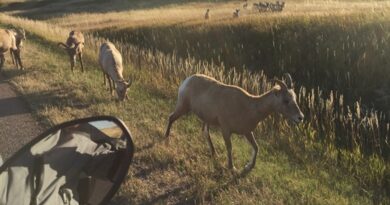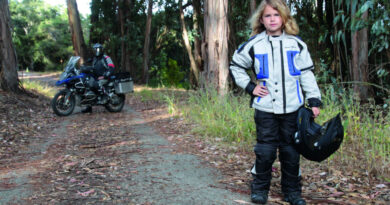Parenting in the Valley of Death: A father and son adventure
“Oof! Aauuhh! Whoof!”
Drew let out his full lexicon of grunts and hollers, which, at 11 years old, were funny if not extensive. Also amusing was that I was the one doing all the work, groaning and struggling to navigate the hill climbs, boulder gardens and sand washes before us. He was just the passenger along for the ride, but to hear him over our two-way communications system, he was really working hard.
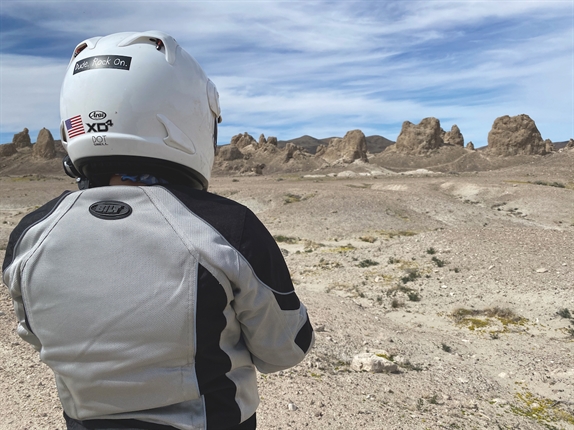
We had started our adventure in the Sierra foothills, then traveled east toward the Mojave Desert and eventually, the mountain passes near Death Valley National Park. But unlike most tourists that make their way via nicely paved roads, we were going in the hard way: over an old stagecoach road to Goler Wash and then over Mengel Pass. These roads—mostly jeep trails and some single-track—are rarely predictable and always challenging. I have ridden these trails many times before, always with another adult present, but this was an important trip and worth the effort.
I have been a parent for 13 years and have done my best to navigate the role. I have never claimed to be great at being a father, better than my own dad most certainly, but not deserving of any awards. Like any parent, I have quietly contended with challenges as they come. In the case of my son Drew, my biggest struggle has been to compete with the small, thin electronic device now nestled in his backpack.
If I allowed it, Drew would be on his iPad from when he got up in the morning to when he went back to bed. This is not so different from me when I was his age when Ataris and Nintendos were king. But unlike my dad, I am present and want to connect with my son. Still, competing with electronics for his interest has proven to be a challenging endeavor.
Drew and I have been on several motorcycle adventures. He loves them in theory, but in the moment, he gets bored and is constantly asking when the day will be done. To combat this, I chose a route that was as intense and interesting as possible, with views and history and challenges that would hopefully captivate his interest. I even loaded the bike into our truck for the first and most boring¬ five-hour leg of the trip, so the gravy riding would be even more proportionate.
As we bumped over an old stagecoach trail along the edge of Panamint Valley, I said, “This road was built mostly by Chinese immigrants, Drew. Almost every rock and boulder you see was hand laid. These days almost no one sees this area. The road is just too difficult to pass in anything but 4x4s and bikes like ours.”
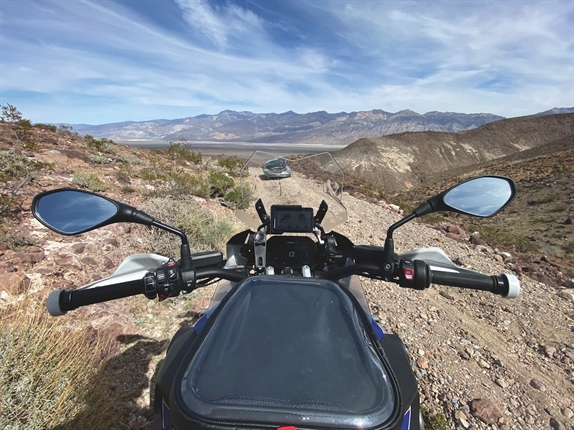
As if on cue, we rounded a corner and stopped staring face-to-face with a Ford Mustang on the trail.
“Is that a 4×4?” Drew asked, staring wide-eyed at the silver sports car.
“Definitely not,” I laughed.
On closer inspection, the car seemed deserted as the hood was missing and tow chains still adorned the frame.
“It looks abandoned,” I said. “Maybe it was stolen and taken for a joy ride. We’ll report it when we get back to civilization.”
We edged around the wreck and continued down the trail, soon dropping into the valley headed toward the eastern mountains before turning south and skirting another dirt road.
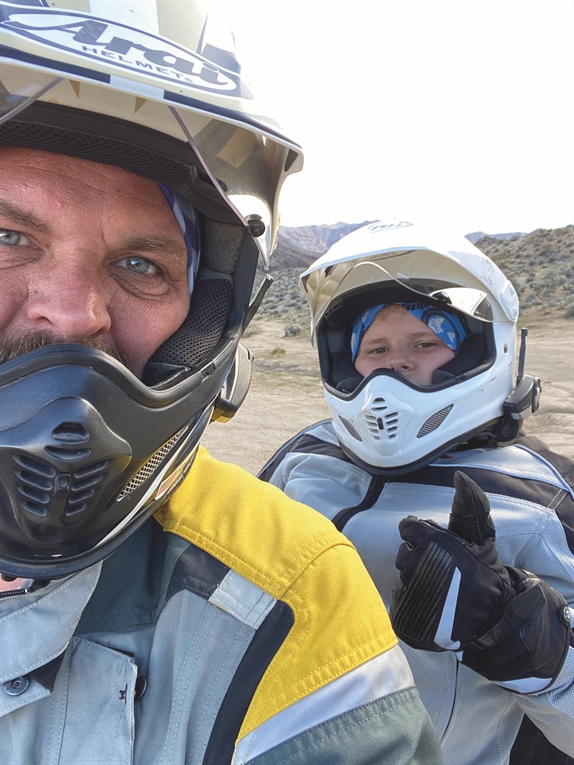
“See those huge mountains, Drew? That’s where we’re going. We’ll make camp on the other side of them.”
Drew groaned. “How are we going to get over those? Will we have to walk?”
“Haha, no, buddy,” I replied. “There is a spot called Goler Wash, where water flow created a canyon through the mountain. We’ll enter there and work our way up gradually.”
Once we found Goler and headed east, we picked the smoothest line up the rocky slopes. The hill climbs were tough as between Drew and all of our gear, the weight was biased well to the rear. Even with the suspension preload and traction control set to maximum, it was easy to wheelie the torquey BMW R 1250 GS Adventure. Throttle and clutch control was key, as was intense concentration.
Right around this time, Drew opened up, launching into a monologue about his favorite video games. I struggled to listen and ride, not wanting to interrupt his passionate presentation. I asked questions, laughed with him, and did my best to be interested in a world I knew so little about.
As we cleared the worst of Goler and enjoyed some smooth trails, I pointed out old mines, and Drew made a game of counting purple cactus plants. I quizzed him on the knowledge I had shared along the trip, asking him about Joshua trees, Chinese immigrants, and landmarks.
Suddenly, and without warning, the trail became intensely difficult. The bike began to drift as gravel gave way to fluffy sand and technical hill climbs. Drew was growing nervous, clinging tight to me as we maneuvered our way through the challenges.
“Don’t worry buddy, I’ll keep us safe, and it’s OK if you want to hop off and walk through some of this. Your call, OK?”
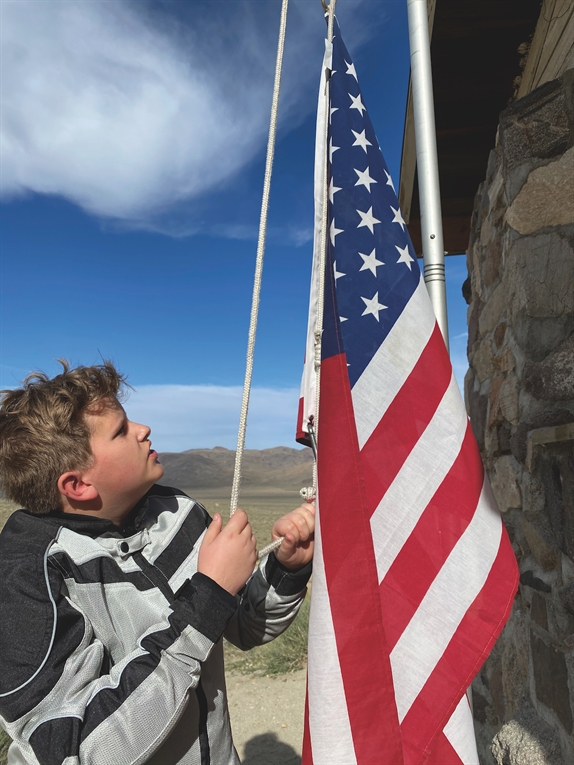
He stayed with me through the most challenging bits, then ironically chose to walk through some of the easier parts. I shrugged and rode on, encouraging him via the COMM system as he trudged through the sections on foot.
The challenges eased, and we made our way to Mengel Pass, stopping at the summit to enjoy the incredible open views.
“This is it, buddy. A few more technical bits, and we’ll have a smooth ride to camp,” I said.
The eastern slope of Mengel Pass had the distinct advantage of gravity, which was helpful when taking on the impending challenge just beyond the summit. The section, aptly named “Boulder Garden,” was a mass of giant, smooth boulders and smaller rocks impregnated in the short canyon traversal. Riding through required no engine power due to the incline, but only small, measured movements with attention to avoiding tip-overs due to side impacts of high-centers with the solid, uneven terrain. Drew opted to walk the garden, then began to run as I picked up the pace on my newly unladen bike.
“I thought you were gonna run me over!” he barked with a laugh.
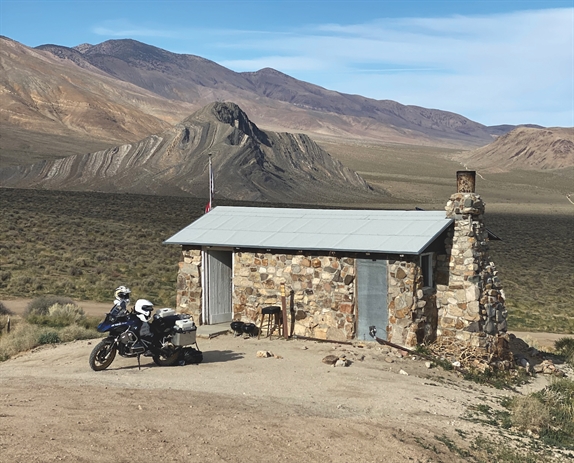
Finally, we entered Striped Butte Valley and skirted the trails toward camp. Along the way, we came upon a small, stone cabin proudly situated on a high hill along the western edge of the valley.
“That is called the ‘Geologist’s Cabin,’” I explained. “It’s been here since the 1930s and is free to visit and even stay, so long as it’s not occupied. Want to check it out?” Drew nodded enthusiastically as we took a fork in the trail, heading up toward the cabin.
“No trucks or bikes around, it looks vacant. We can continue to our campsite or stay here for the night. Your call, buddy.”
Drew chose the cabin, and we hopped off, shedding our gear against the hot sun and exploring the area. I opened the old wooden door, revealing a clean, single room with tables, windows, stocked shelves, and even neatly packed sleeping bags and blankets.
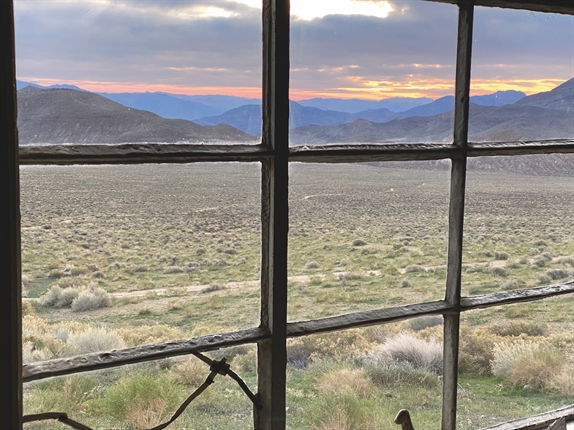
“People who stay at the cabin take responsibility for keeping it clean and provisioned. It is encouraged that we do the same, as will the people that come after us,” I said as I pointed at a shelf where an American flag sat reverently folded. “We’ll unfold the flag and fly it on the pole outside; that way, anyone that enters the valley will know the cabin is occupied. Tomorrow we’ll re-fold the flag and stow it for the next visitors.”
We went outside and unfolded the flag then ran it up the pole and watched as it fluttered in the southern winds. The task complete, Drew asked if he could play with his iPad. After a long day of riding, he was deserving of a break. I nodded, and he retrieved the device, nestled himself into an outside chair, and lost himself in a game.
“Da-aaad, where’s the wi-fi?” he asked.
“None of that here, buddy, we’re a good 80 miles from civilization,” I replied.
“UGH. I thought since we were at a cabin, we’d have power and internet!”
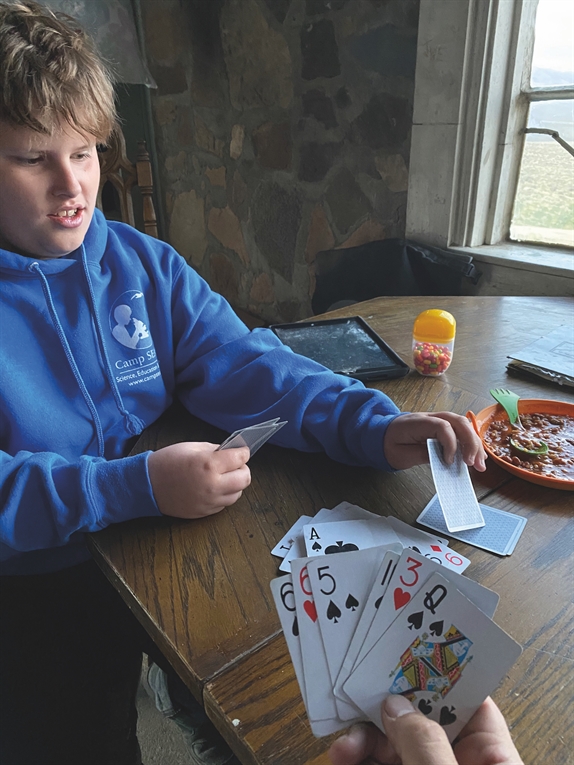
We each rolled our eyes, and he compromised with an off-line game. I then set up our bedding on the cabin floor, cooked up some dehydrated food, and invited Drew in for dinner and a game of Crazy Eights, compliments of a deck of cards left by another adventurer. For the next few hours, we whittled away the daylight with games, telling stories and laughing with one another. With some encouragement, Drew wrote an entry in his note pad, highlighting the joys and challenges of the day. He included a surprisingly detailed account of his adventure, even opting to sketch a detailed map of our route. We decided on an early night, nestling in our sleeping bags as the sunset and the high winds whistled against the old structure.
The next morning, we woke early and caught the sunrise as we made a batch of hot chocolate. Neither of us slept well as the inflatable pads were stiff, and the winds had been ominous and loud. Quietly we packed our gear and mounted it to the bike, refolded the flag, then suited up and headed east toward the road to Furnace Creek.
“It’ll take us a few hours, but we can make our way into Death Valley and eat a late breakfast there. Sound good?” I asked.
Drew wearily agreed, then began another monologue about video games. I listened and encouraged the chat, trying to remember important details.
We stopped at Badwater, the lowest point in North America.
“Take a look at the GPS, buddy. We are over 250 feet BELOW sea level!”
Drew stared at the screen, wide-eyed. “Whoa! How are we not drowning right now,” he asked?
I laughed and explained what I knew about land and ocean, which admittedly wasn’t much, and soon we were at a small restaurant in Furnace Creek. Settled with our plates of food in front of us, I discussed our options for the day. As I laid out potential routes, it became clear that with his disconnect from the digital world and a dismal night of sleep, Drew was looking for the end of this adventure. I was disappointed, but I did not want to push anything on him. When I suggested we cut the trip short, he happily agreed.
With Furnace Creek in our rearview mirrors, we made our way back via asphalt, opting for fun and interesting roads while keeping a good pace, and in a few hours, we were back at the truck where I loaded the bike, and we settled in for the five-hour trek home.
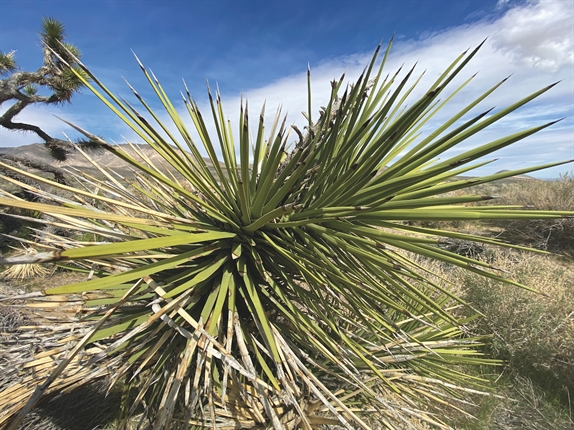
Thinking about our adventure as I drove, I wondered if it had been worth it. Did it matter that we were returning early? Did Drew have any fun at all? Would he want to go on another adventure, and, if not, what else could I do to connect with him? It was a struggle to think on, and I found myself depressed at my skills as a parent.
We arrived home late. I directed Drew to shower and get some sleep, then followed suit myself as both of us were exhausted and needed rest. I slept well that night and awoke the next day with thoughts of home maintenance and leisure time. Drew asked for extra chores, wanting to earn money for a new game. I set him to work washing cars and vacuuming floors, then thanked and paid him for his efforts. Things were settling back into our normal routine.
Later that afternoon, as I started dinner, Drew was in the adjoining room on the couch video chatting with his best friend. As I prepared the food, I overheard Drew as he shared stories with his friend.
“And then we went to this really cool cabin, and I learned how to unfold the American flag and beat my dad at Crazy Eights, and the winds were crazy, and some of the roads were scary but fun! And there was this really cool abandoned car, and…”
Hearing that, I smiled, and my heart began to swell. I realized we had a perfect adventure.

